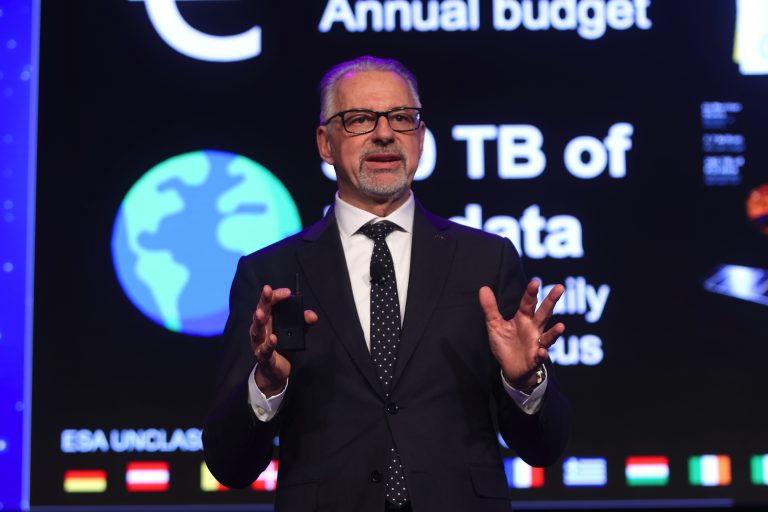WASHINGTON — The head of the European Space Agency called on Europe to increase overall spending on space as he prepares a new three-year budget for the agency.
Testifying before a European Parliament committee May 13, Josef Aschbacher said it was a “miracle” that Europe has achieved leadership roles in some space fields, like Earth observation and navigation, given that its spending on space lags far behind the United States and China.
He noted that worldwide spending on government space is about 100 billion euros ($112 billion) annually. About 60% of that is spent by the United States and 15% by China, whereas Europe accounts for 10%.
Europe’s accomplishments in space, he concluded, “are almost a miracle knowing little Europe has invested compared to other countries in the world.”
He argued, though, that Europe should not be satisfied with such miracles. “We have to make sure that our funding level is more adequate to what our requirements are,” he said.
“All the space budgets in Europe,” he said, including ESA, the European Commission, Eumetsat and individual nations, “need to increase. It cannot be that we are a world economic powerhouse but in space we are relatively modest in terms of our investment.”
His comments come as ESA’s leadership prepares its next three-year budget that member states will take up at a ministerial conference in November. He hinted in his speech that ESA will again seek a significant budget increase.
“I’m preparing at the moment with my member states a budget proposal that is probably beyond 20 billion for the next three years, maybe even a bit more if I am very optimistic,” he said. A three-year budget of 20 billion euros would be 18% higher than the budget approved at the previous ministerial in 2022 of 16.9 billion euros. That was about a 17% increase from the previous three-year budget.
He said ESA’s approach of funding three years at a time was preferred over the European Commission, which has budgets, known multiannual financial frameworks or MFFs, that span seven years, with the current MFF running through 2027.
“We can react very fast to the current geopolitical situation,” he said, “where Europe needs to strengthen its autonomy, strengthen its independence, build up capacity and therefore be ready. We cannot wait until ’28.”
The hearing also examined how space is managed in Europe, with varying roles and responsibilities for ESA, the European Commission and others. “Our model of governance is complex and multilayered,” said another witness, Antonella Forganni of the ESSCA School of Management. “The overlapping of entities creates a fragmented landscape.”
“On the international stage, we lack leadership. We are seen as potential partners but we fall behind in strategic vision and technological progress,” she noted, citing the lack of a European human spaceflight capability. She said that the European Union should take more of a leadership role in space, arguing its governance model was preferred over that of ESA.
Aschbacher disagreed that Europe lacked leadership. “Europe is quite good in some domains,” he said, citing achievements in science, Earth observation and navigation. He also downplayed concerns that it is difficult for ESA and the European Commission to cooperate. “It may sound complex, but we have made it to work,” he said, but added there is ongoing discussion among ESA member states on how to improve and simplify that cooperation. “If there is a will, there is a way.”

